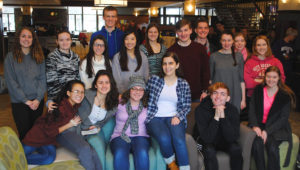This semester, twenty-two first-year Houghton students are living and studying in London as part of the Honors in London program.
The students’ routine follows weekly rhythms: on Monday mornings, all the students and professors gather in a small upper room of St. Augustine’s Church for a “plenary session,” during which the major topics for the week are introduced. This past week, that meant exploring “the new ways nineteenth-century Westerners started thinking about history and their place in it,” according to Ben Lipscomb, one

of the three Houghton professors who traveled to London to teach the program this spring. The other two professors are Susan Bruxvoort-Lipscomb and Madison Murphy. At the end of plenary, students are handed Museum, Art and Gallery Guides—called “MAGGs”—which detail the museums and pieces of art they will explore on their own time during the week. On Tuesdays, Wednesdays, and Thursdays, the students are split into two groups for “colloquy sessions” during which they discuss the week’s readings. On Fridays, students meet for another plenary session, which is often geared towards helping them write their weekly paper, and which also includes a chapel service. On Saturdays, students buckle down to finish writing their weekly 5-7 page paper before the midnight deadline. Sundays are their day of rest.
The London program does not involve taking separate classes; instead, philosophy, history, art, literature, music, and theology are intertwined in a study of the development of Western modernity. Ben Lipscomb said that one of the things he values most about the structure of the program is “the feeling of wholeness.” He explained that the tight integration of disciplines in the program is crucial to this feeling: “We and the students work really hard, but…we’re not pulled in as many different directions, and that allows us to enter more deeply into the experience and get more from it.” He said that a visiting parent of one student compared the program to a spiritual retreat, “not in the sense that it’s so restful, but in the sense that a lot of typical distractions are excluded so everyone can concentrate on doing something transformative.” A student in the program, Ally Stevick ’21, said “One of the things that I’ve appreciated most about the program so far is the chance to be part of a group of students all learning the same material.” Stevick said that this structure provides a “common base for conversations” and “a built-in network of other people” who are all wrestling with the same ideas. Another student, Abigail Wilkerson ‘21, spoke of the perspective the program helps students develop, saying: “Because of this program I can now look at current social structures in a new light.” Susan Bruxvoort-Lipscomb, another of the program’s professors, said she enjoys teaching the program because of the “wide foundation of knowledge” it gives students. She said, “I love it when we get to the 20th and 21st century sources and students can say, ‘This reminds me of something we read from the 17th century’ or ‘I can see how this idea developed from period to period.’”
The Honors in London program has experienced its own transformations over the years. Ben Lipscomb said that “the program ran, in its first manifestation (which covered the whole sweep from the ancient Greeks and Hebrews up to the present) from 1996-2011. Then a four-year hiatus.” The program’s TA, Anna Schilke ‘19, was an Honors in London student in the 2015-2016 academic year, when the program was reinstated. This year’s cohort is the third to go to London and study the new curriculum. Schilke said, “Coming back to London feels like stepping into a life, a life that has flowed and ebbed while I was away, but not changed a lot. But that’s an experience that’s unique to me, the sole student who has lived here before.” She said that the first-year students are “full of the same wonder that I remember experiencing—wonder for the tube and the cafes and the rain. Wonder for the sheer difficulty of the paper weekends. Wonder at the fact that we’re in a foreign country, not as visitors but as temporary residents.”
“Being in London Honors is truly a life-changing experience,” Wilkerson said. Stevick agreed, saying she’s especially appreciated “the independence of living in such a large and diverse city for the first time as an adult.” She said, “I’ve been able to retrace the steps of many of my literary heroes, but I’ve also been able to get to know the city as it is today—how to navigate the public transport by myself, and where to buy the best groceries.” Schilke concluded, “I’ve always been an advocate of the program…It’s been one of the best experiences of my life. Even on the second go.”
